Top Tips For Boosting Testosterone Naturally
Testosterone Boosting Tip #1: Lose Weight, and Your Testosterone Levels Will Soar!
Obesity and excess fat are two of the most decisive factors which negatively influence your body's ability to produce its Testosterone naturally. Obesity exacerbates the decline in testosterone associated with aging, making symptoms more likely and more severe.
In a recent meeting of the Endocrine Society, the conference made a unique point to emphasize the powerful ability of weight loss as a method to amplify Testosterone Production.
The older you get, the more that being overweight will impact your body's ability to produce sufficient Testosterone. Overweight men can experience clinically low levels of Testosterone at an age as young as 30.
Eat Less Sugar, Release More Testosterone!
If you've decided it's time to shed weight, one of the most important things for you is to reduce the level of processed sugar you take drastically. Processed sugar wrecks your blood sugar and makes you more at risk for Diabetes. Fructose (including High Fructose Corn Syrup) is one of the primary sugars you should avoid. Simply cutting sodas and artificial fruit drinks will go a long way to reducing sugar intake.
Even drinks that sound healthy, like agave nectar and fruit juices, are incredibly high in sugar. Eating fruit and drinking water is much healthier than drinking even natural fruit juice.
drinking even natural fruit juice.
The optimal level of daily fructose consumption is around twenty-five grams. This includes all forms of fructose, not just drinks. It is imperative to observe this dietary guideline if you have high cholesterol, diabetes, hypertension, weight issues, or insulin resistance.
Limit Carb Intake for More Testosterone!
It is also essential to recognize that carbohydrates convert quickly into glucose, which means that you should be very conscientious regarding your intake of grains, mainly processed grains.
If you are trying to drop pounds, limiting or avoiding milk is a good idea because it concentrates lactose significantly. There is strong evidence that excessive lactose consumption can increase the risk of diabetes and insulin resistance.
Particular carbohydrates to avoid are pretzels, waffles, bagels, and breakfast cereals comprised primarily of processed grains. The grain-sourced foods in your diet should be whole wheat and dense in nutrition.
Optimize Your Diet for More Testosterone!
Just taking these steps will likely do a number for your health and weight loss goals, but it's also essential to ensure you get the nutrition that your body needs from optimal sources. Make sure that you choose foods with healthy fats, and avoid transfats. Also, include various vegetables in your diet, and try to source your carbohydrates primarily from vegetables.
The human body responds very well to vegetables that are dense in nutrients and complex sugars because the body has to work to break down the sugars, which helps regulate your blood sugar and burns more calories via digestion.
Finally, you should primarily choose lean proteins and proteins high in Omega-3s, including many types of fish.
Exercise and Eat Right for More Testosterone!
Combine this intelligent dieting with a regular workout routine. We encourage exercising at least four times per week and engaging in cardiovascular and anaerobic exercise. Taking control of your weight is one of the most powerful steps that you can take to enhance your Testosterone, and eating healthy and engaging in regular physical activity will help you burn the fat!
Testosterone Boosting Tip #2: Increase Testosterone with Dietary Zinc and Zinc Supplements
For your body to produce optimal levels of Testosterone, you must provide your body with the vitamins and nutrients necessary for the body to synthesize the hormone most effectively. Zinc is one of the most essential nutrients for Testosterone Balance.
Zinc Supplementation is a highly effective means to enhance Testosterone Levels for men experiencing below-normal Testosterone Production.
Zinc Highly Correlated with Testosterone
Medical research has clearly shown that men who do not get sufficient zinc in their everyday diet are more likely to experience Testosterone Deficiency. In contrast, patients that fortify their diet with zinc can increase their Testosterone Concentrations.
There is even evidence that zinc sustains the body's Testosterone even during long-distance cardiovascular activity, which has been shown to have a depressant effect on Testosterone (Anaerobic Training and High-Intensity Cardio Increase Testosterone, while Endurance Activities tend to decrease Testosterone.
Zinc Deficiency More Common with Age
Zinc deficiency is a significant issue for adults sixty years and older. The National Health and Nutrition Examination Survey approximates that around 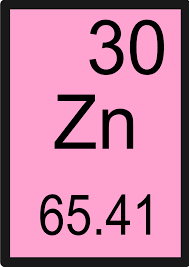 forty-five percent of people in this age group do not get sufficient zinc in their diets. Even among individuals that take dietary supplements, nearly a quarter of men and women in this age group still did not get adequate levels of zinc.
forty-five percent of people in this age group do not get sufficient zinc in their diets. Even among individuals that take dietary supplements, nearly a quarter of men and women in this age group still did not get adequate levels of zinc.
The best way to Get Zinc is Through Diet.
Supplements are a helpful way to ensure you get the zinc you need, but your primary method of obtaining zinc should be through your diet. Foods containing zinc contain a lot of protein, including fish and meats. Yoga, beans, raw cheese, and raw milk are other ways to get zinc naturally.
Vegetarians Susceptible to Zinc Deficiency
Because so many of the best natural methods to get zinc are from meat and dairy products, vegetarians often have issues getting the zinc they need. Also, industrial agriculture that relies heavily on pesticides and fertilizers can drain farmland of nutrients, reducing the concentrations of the zinc absorbed by the plant and passed onto your diet.
Avoid Over-Cooking Foods to Preserve Dietary Zinc
How you prepare your food also affects the amount of Zinc you will receive in the finished product. Cooking food too hard tends to rapidly drain the food of its zinc concentrations, especially with vegetables, so we recommend cooking veggies al dente or eating them raw. Microwaving your vegetables is a good option as well. Microwaving will heat your vegetables without overheating them or burning them.
Zinc Supplement Guidelines
Of course, if you are worried about not getting enough zinc in your diet, supplements are always an option. If you do choose to turn to supplementation, don't take more than 40 mg of zinc per day because this is considered the maximum healthy limit.
Unlike many vitamins like Vitamin D and Vitamin C, excess zinc can impact your body's ability to intake other vital nutrients such as copper and induce side effects such as nausea.
Testosterone Boosting Tip #3: Lift Weights for More Testosterone
If you are concerned with sustaining optimal Testosterone Levels, one of the best activities you can engage in is Anaerobic Exercise. Weight lifting is healthy for the body in a number of different ways, but to boost your Testosterone, the optimal word for your benefit is Intensity.
The Body Releases Testosterone in Response to Intensity
The body releases Testosterone most efficiently when you engage in physical activities that put pressure on your body. This doesn't mean you should overwork your body because straining it can be dangerous, but you can set up a workout plan that tests your body's limits without breaking them.
The Four Factors of Testosterone-Boosting Exercise
When engaging in weight training with the explicit purpose of raising natural Testosterone Levels, there are four factors that you need to think about: The Speed of the Reps, the Number of Reps, the Amount of Weight, and the Number of Muscles Engaged.
Speed of Reps-The rate at which you engage in your reps is critical regarding Testosterone Production. Your body goes through more effort when you slow down your repetitions, and your body produces the hormone more readily.
The number of Reps-The number of repetitions is also significant for endogenous Testosterone Secretion. Remember, it's more important to engage in 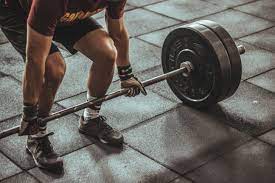 fewer, slower repetitions than more, faster repetitions. We encourage sets of three, with two sets of eight to ten near your max weight and six slow reps at your maximum weight.
fewer, slower repetitions than more, faster repetitions. We encourage sets of three, with two sets of eight to ten near your max weight and six slow reps at your maximum weight.
Amount of Weight-Your body produces the most Testosterone in response to you pushing your body to its maximum limit. Do the highest amount of weight so you can safely perform a complete, slow set without putting yourself at risk.
The number of Muscles Engaged-Your body produces Testosterone in response to the surface area of muscle that you work out, so if you engage large groups of muscles all at once while also following the three previous steps, you will produce the most possible natural testosterone.
Why Does Slowing Down Exercise Reps Boost Testosterone?
It might seem counter-intuitive at first that slowing down your exercise increases your Testosterone, but you work out harder when you work out more slowly. Slow Anaerobic Exercise is a powerful, High-Intensity Workout.
The scientific reason for this is that incredibly slow repetitions increase the interactions between your muscle cells, causing them to develop and fortify the peak amount of cross-bridges among your muscle proteins, which is how your muscles increase in size and strength. Maximizing the number of muscle cells stimulated aggressively amplifies Testosterone Production.
Limit Carbohydrate Consumption in the Period After Exercise
To maximize the benefits of Testosterone and Human Growth Hormone released during physical activity, eating the right foods is crucial. Carbohydrates eaten after exercise interferes with optimal hormone function, depressing your body's ability to build muscle and release physiologically beneficial hormones.
A small protein snack with a glass of water after exercise is the best way to both satiate hunger and give the body the materials it needs to rebuild after a good workout. However, choose natural sources of protein over-processed proteins because shakes and power bars don't fulfill your needs as effectively as good, natural protein.
Testosterone Boosting Tip #4: Optimize Vitamin D Intake
Vitamin D is an essential hormone that belongs to the steroid family, just like Testosterone, DHEA, and Estrogen. Vitamin D plays an integral role in male sexual function, most notably promoting the standard formulation of sperm nuclei.
As a result of its importance in sperm structure, healthy Vitamin D levels are also associated with sperm viability and the number of sperm produced.
Link Between Vitamin D and Testosterone
There is also a strong correlation between Testosterone, and Vitamin D. Men deficient in Vitamin D are much more likely to experience Testosterone Deficiency than men who get enough of the nutrient in their diet. Healthy Vitamin D levels are also associated with enhanced libido.
Studies have shown that obese and overweight males experienced enhanced Testosterone Production after a year when treated with supplemental Vitamin D.
Vitamin D Deficiency is a Major Issue in American Society
In the United States today, millions across the country don't get sufficient Vitamin D. The condition is also a problem in many other societies that have become increasingly sedentary or industrialized over the past fifty years.
Many medical experts consider Vitamin D Deficiency at epidemic levels in America. Vitamin D is produced naturally by the human body when exposed to sunlight. Still, many areas don't produce enough sun, and many Americans don't take the time to expose themselves to the moderate sunlight they need to produce Vitamin D.
Vitamin D deficiency is currently at epidemic proportions in the United States and many other regions worldwide, mainly because people do not spend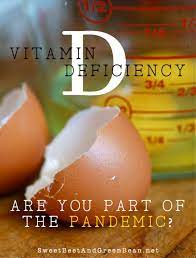 enough time in the sun to facilitate this critical process of Vitamin D production. Also, aging men and women become more susceptible to Vitamin D Deficiency as they begin to produce the nutrient less effectively.
enough time in the sun to facilitate this critical process of Vitamin D production. Also, aging men and women become more susceptible to Vitamin D Deficiency as they begin to produce the nutrient less effectively.
Vitamin D Deficiency Testing
Many people also naturally have issues producing enough Vitamin D, which is not necessarily related to age. A simple test can reveal your body's Vitamin D Levels, known as the 25-hydroxyvitamin D Test, a molecule also known as 25(OH)D.
What are Optimal Vitamin D Levels?
The final opinion regarding optimal Vitamin D concentration in the human body is far from settled. In the recent past, the general recommendation was 40-60 ng/ml, but further evidence has encouraged recommendations to increase to 50-70 ng/ml.
How Can I Get My Vitamin D?
The most effective way to increase your Vitamin D production is to step out into the sun briefly in the hours before and after noon. Ten or fifteen minutes of sunlight is fine for most people. Longer than fifteen minutes without protection puts you at risk of sun damage. Showing your face and arms to the sun is enough, although going out in shorts is even better!
Vitamin D Supplementation Suggestions
If you are in a location where such a concentration of sunlight is not an option, you can also turn to Vitamin D3 Supplementation. A number of foods are fortified with vitamins as well. Recommended Daily Value for Vitamin D is 800 IU, but this also assumes that you are getting the sunlight you need each day. Studies show that to boost Vitamin D concentrations in the body to 40 ng/ml, it can take as much as 8,000 IU.
Testosterone Boosting Tip #5: Limit Sugar in the Diet and Avoid Added Sugar
As we mentioned in an earlier tip, Testosterone Levels are inhibited by body fat, but did you also know that sugar and carbohydrates (especially simple carbs and sugars) have the nasty ability to inhibit Testosterone Production? They also limit the release of Human Growth Hormone by the Hypothalamus. This is because sugar spikes caused by the consumption of excess sugar and carbs cause insulin levels to increase in the blood dramatically.
Insulin Spikes Impact Hormone Balance
Human Growth Hormone can be thought of in some ways as a corollary hormone to Insulin. The more your body uses Insulin, the fewer signals it sends for endogenous HGH. High levels of insulin also diminish Testosterone Production.
Americans Eat Way Too Much Sugar
In the United States, it is clear that we consume too much sugar and too many simple carbs in our diet. The USDA approximates the average U.S. citizen eats four tablespoons of sugar daily. Across the course of a lifetime, this is more than 4000 pounds of sugar!
Why Do We Love Sugar?
It's apparent why sugar is such an issue in the United States. It is readily available, and corn syrup is highly subsidized, making it incredibly cheap to pump into a wide variety of foods. Also, raw sugar can almost be likened to a drug.
It tastes good and isn't too bad in its natural form, but we've processed it down to its most pleasurable components and stripped it of any innate nutrition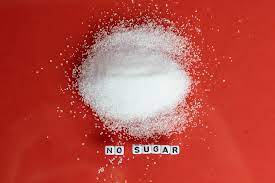 that it once had. Sugar produces pleasure in the human brain by stimulating both opioid and dopamine receptors in the brain.
that it once had. Sugar produces pleasure in the human brain by stimulating both opioid and dopamine receptors in the brain.
Even though we love the taste of sugar, the effect that too much sugar has on the body and our hormone balance can be incredible. Most men and women can experience significant healthful improvements in their lives just by restricting sugar, processed grains, and simple carbs from their diets while being conscientious of complex carbs and natural sugars in the healthy foods they eat.
How Can I Limit Sweets Effectively?
Here are some helpful ways that you can get over your craving for sweets and simple carbs:
Eat at Regularly Scheduled Times - Eating meals each day on a set time frame helps you avoid temptation.
When You Do Cave, Be Smart With Foods You Love - Choose a small amount of cheat food you love and savor the moment.
Engage in Physical Activity - If you start to feel a desire for unhealthy foods, don't be afraid to walk it off!
Turn to Fruits to Satisfy Your Cravings - Fruits are the ideal way to get natural sugars because they are loaded with nutrients and fiber.
Chew Some Sugarfree Gum - Simply having something to occupy your mouth can make the craving go away.
Just Make the Decision to Stop and Stick to It - Many people find significant success just by deciding to tune out their desire for sweets all at once.
Combine a Small Amount of Decadence with a Healthy Snack or Meal - Enhance the healthy things you eat with a dab of chocolate or caramel to treat yourself modestly.
Don't be Afraid to Cave in a Minor Way if Things Get too Tough - Don't beat yourself up if your cravings become undeniable. Enjoy a small dessert, but don't let it ruin your resolve to limit sweets.
Testosterone Boosting Tip #6: Reduce Stress
Most people compartmentalize the physiological and psychological aspects of themselves. They think of physical and emotional stress as two parts of the human condition. This is a huge mistake. Psychological stress is intimately connected to the body's physical condition, and one area where this is made especially clear is hormone health.
Stress is a Condition Associated with Cortisol
All forms of stress are highly related to a hormone known as cortisol. Cortisol stimulates the body's fight-or-flight response, prepares it for split-second decision-making, and stimulates the body to optimize processes that protect it from short-term harm. This is a good thing in small doses; we need some cortisol to function optimally.
Chronic Stress Leads to Hormone Imbalance
The problem is that any chronic stress causes us to produce too much cortisol, which can have a devastating effect on Hormone Balance over time. Cortisol is a steroid hormone, like Testosterone, and the two hormones compete for resources. If you are stressed out all the time, your body overemphasizes the production of cortisol, which eats away at your body's ability to make Testosterone.
Cortisol Stimulates Survival Mechanisms at the Cost of Overall Health
In addition, cortisol also blocks your body's ability to utilize Testosterone. Researchers theorize that the reason why Testosterone becomes less active in the presence of cortisol is that Testosterone is primarily associated with activities and traits not associated with self-preservation, including aggression, competition, and mating. In contrast, cortisol is a hormone that increases your body's ability to preserve itself in the face of external circumstances.
Chronic Stress Feeds Off of Our Inability to Cope with Anxiety
Perhaps because of our large and complex brains, stress has become a multifaceted psychological issue. The same mind that allows us to achieve such amazing things also has the potential to leave us chronically worried or anxious over forces that we have no control over or are constantly plaguing our minds.
As you can imagine, chronic stress rapidly depletes Testosterone Levels in the body. It also increases the risk of various health conditions ranging from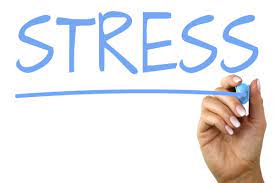 infertility to hypertension to stroke.
infertility to hypertension to stroke.
What Can I Do to Control My Stress?
There are a number of highly effective tools to reduce stress and help restore more normal Testosterone Production and Hormone Balance.
Any sort of quiet reflection is beneficial, including meditation and prayer. This quiets the mind and separates outside stressors from the inner tranquility of the mind.
Yoga is also an exemplary method to enhance physical and psychological well-being by promoting inner and outer strength and emphasizing physiological relaxation.
Laughter is a unique and simple way to help control stress. Laughter in itself is an evolutionary tool to dispel stress. It encourages blood flow and makes you and those around you feel more at ease.
Controlled breathing, an aspect of meditation and yoga, also relieves stress by optimizing blood flow and encouraging purposeful breathing and action.
Finally, positive visualization is a method of relieving stress. Positive visualization aims to imagine yourself in a more peaceful state so that your body and mind adapt and start to take on the characteristics fostered by your imagination.
Testosterone Boosting Tip #7: BCAA Supplementation for Testosterone
Branched-Chain Amino Acids, also known as BCAAs, are essential for sustaining the health of the human body. In particular, BCAAs are powerful rejuvenative nutrients which increase the body's healing capacity. The human body does not naturally produce these Amino Acids, so they must be consumed in the diet or taken as a supplement.
Benefits of Branched-Chain Amino Acids
There is substantial medical evidence that BCAA supplementation mitigates injury risk and enhances performance, most vividly demonstrated in the Journal of Strength and Conditioning Research. Another study, released in the medical journal Metabolism, tested the impact of Branched-Chain Amino Acids on athletes.
These participants either took a placebo or administered the supplement every night for thirty days. They also engaged in intense physical exercise regularly throughout the study. Participants taking BCAA were found to have much higher levels of Testosterone than their placebo counterparts.
BCAAs are also shown to soften the effects of stress, another factor that has a powerful impact on Testosterone Release and Utilization.
BCAAs and Exercise
Remember when we discussed how strenuous physical activity enhanced Testosterone Production? When combined with BCAA Supplements, this benefit is enhanced even further. Dairy Products are known to contain some of the highest levels of Leucine, a potent Branched-Chain Amino Acid. Among the dairy products which contain Leucine most potently are whey protein and select cheeses.
Benefits of Leucine
Leucine only provides this benefit in abundance when combined with vigorous anaerobic activity, so don't think you can just start eating whey protein, and your Testosterone Levels will increase. Those calories will go straight to your gut.
But if you use BCAAs to enhance physical activity, you'll likely experience real advantages in increased strength, muscle mass, and Natural Testosterone Secretion.
Finally, it's most beneficial to absorb Leucine and other BCAAs in foods that contain them naturally, or the body may absorb them too quickly, which can lead to insulin spikes that inhibit Testosterone and HGH Production.
To maximize the impact of Leucine, choose Whey Protein or other foods which make the body work for the protein. Other sources of Leucine include wheat germ, oats, and animal proteins.
Benefits of Valine
Valine is another BCAA that significantly benefits anaerobic exercise enthusiasts because it enhances protein metabolism, helping the body convert protein to muscle more efficiently. It also repairs damage to the muscles and is a mechanism by which the muscles increase in mass and strength.
There is also evidence that Valine (and other BCAAs) can be used to mitigate the damage of gallbladder disease and liver disease. Natural foods which contain Valine are peanuts, soy, mushrooms, meat, dairy, and grains.
Benefits of Isoleucine
The primary benefit of Isoleucine is that it increases the body's ability to expend energy and overcome feelings of fatigue. Because of its metabolism-boosting power, this Branched-Chain Amino Acid can burn fat, increase exercise capacity, and supply the body and mind with much-needed energy.
Testosterone Boosting Tip #8: Eat Heart-Healthy Fats
Testosterone is a steroid hormone that is converted from cholesterol by the testes. Human beings get cholesterol from the fat that they consume. Many people think that fat is invariably bad for you, but the more we understand the human body and its needs, the more apparent it is that sugars and carbohydrates are the main culprits for weight gain and obesity, as well as Testosterone Deficiency.
Our fear of fat is primarily related to misconceptions related to early scientific studies when we were still trying to figure out how foods like fat and sugar interact with the body. It may seem logical that Fat Breeds Fat, but this is far from the case! Eating healthy fats responsibly can help you lose weight 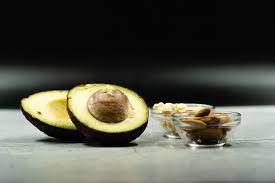 faster, keep you healthier, and preserve optimal hormone balance!
faster, keep you healthier, and preserve optimal hormone balance!
What Happens to Testosterone When We Eat Fat?
Eating healthy fats conscientiously, on the other hand, has the power to enhance and optimize your Testosterone Production. The Journal of Endocrinology & Metabolism recently released the results of a study in which subjects were fed one hundred grams of fat daily for fourteen days.
After the test period was completed, researchers took blood samples of the patients to monitor hormone concentrations related to Testosterone.
Sex Hormone-Binding Globulin Inhibits Free Testosterone
They found that a particular hormone, known as SHBG, or Sex Hormone-Binding Globulin, was inhibited by this form of diet. Testosterone binds with SHBG in the bloodstream, preventing it from doing its job.
Think of this form of Testosterone as stored. Lower levels of SHBG mean that you have more Free Testosterone. Free Testosterone is Testosterone that the body can immediately use to stimulate tissues throughout the body.
The Body Needs Healthy Fat
Many people think of Saturated Fats as unhealthy, but the human body needs Saturated Fat to function correctly. The most dangerous form of fat is Transfat, and this form of fat should be avoided if at all possible.
Polyunsaturated Fats and Monounsaturated Fats are also an essential part of the diet. All three of these forms of fat are necessary for the body to produce Testosterone to fulfill the body's needs efficiently.
How Much Fat Should I Include in My Diet?
Evidence suggests that a good rule of thumb is that you should get forty percent of your calories from fat products, primarily from healthy fats. Individuals that consume less fat are more likely to experience issues related to Testosterone Deficiency.
It is vital to note that the human body needs healthy fats from vegetable and animal sources to operate in peak conditions. If you get too many calories from carbs and sugars, you are doing your body a disservice and putting yourself at an increased risk of obesity and diabetes.
What Are Some Quality Sources for Healthy Fat?
The following are some examples of good fat sources that can enhance your Endogenous Testosterone Production:
Uncooked Natural Nut Oils
Palm Oil
Fatty Fish Such as Salmon
Meat Fed on Grass
Avocados
Egg Yolks
Raw Pecans, Almonds, and Other Nuts
Butter Made from Dairy Cows Fed on Grass
Coconut Oil
Coconut
Olive Oil
Olives
Testosterone Boosting Tip #9: High-Intensity Exercise and Intermittent Fasting
High-Intensity Workout Routines and Programmed Fasting have been proven to impact Testosterone Secretion positively, and these effects are magnified when combined. As we mentioned in a previous tip, excessive cardio exercise can limit the influence of Testosterone, and slow, methodical heavy weight lifting can positively benefit Testosterone Balance.
What Makes High-Intensity Exercise Increase Testosterone?
Intense, quick exercises are a fantastic way to enhance Testosterone Production while also working out large groups of muscles that benefit from cardiovascular exercises. These exercises have also been clinically proven to slow the rate at which Age-Related Testosterone Deficiency becomes  problematic for male health.
problematic for male health.
This form of exercise provides many benefits of extended cardio or aerobic activity without the negative influence on Testosterone.
How Does Intermittent Fasting Increase Testosterone Levels?
Intermittent Fasting is a dietary technique in which one goes for an extended period of the day without eating and consuming all the necessary calories in a small window. This diet promotes HGH and Testosterone Secretion by enhancing the activity of a number of different hormones associated with satiation, including melanocortins, cholecystokinin, glucagon-like peptide-one, adiponectin, leptin, and insulin.
There is evidence that this change in hormone balance can be highly beneficial for many men, increasing the rate of Testosterone Release and its Activity in the short term while slowing down Age-Related Low-T and boosting sex drive.
Exercising after a period of Intermittent Fasting is highly beneficial, and consuming a protein-rich meal after engaging in your daily workout can make Hormone Balance even more optimal for Testosterone Secretion and Weight Loss.
What is Peak Fitness?
Peak Fitness is a form of High-Intensity Exercise which seeks to work out the whole body and emphasize the Hormone-Boosting Benefits of such activity. The following is an example of the kind of High-Intensity Workout which will benefit your health:
Start your routine, going slowly, emphasizing the warm-up process.
Push your body to the limit for thirty seconds, going as fast and as hard as physically possible.
Drop the pace for the next minute and a half to give your time to recover.
Repeat steps two and three seven additional times.
After the eighth cooldown, the workout is complete!
High-Intensity Workouts are a simple and effective routine, and you have immense flexibility in how you'd like to structure your routine! Use whatever equipment you'd like. You can swim, run on the treadmill, and work on the elliptical- you can convert practically any form of cardiovascular exercise into a fantastic Testosterone Enhancing Activity.
Tips For Those Starting On High-Intensity Exercise
Before starting High-Intensity Workouts for the first time, understand that your body may not be ready for the entire process on your first try. Don't be embarrassed to work your way up to the whole, vigorous twenty-minute routine throughout a few workout sessions. Also, it's important to remember to stretch properly before starting the routine to reduce the risk of injury.
- 0001 What Are Normal Testosterone Levels For Men And Women Throughout Life? [Last Updated On: February 14th, 2025] [Originally Added On: May 26th, 2020]
- 0002 The Testosterone Factor [Last Updated On: October 28th, 2025] [Originally Added On: May 28th, 2020]
- 0003 Testosterone Can Help Relieve The Menopause Symptom Of Hot Flashes [Last Updated On: February 14th, 2025] [Originally Added On: May 29th, 2020]
- 0004 How Does Low Testosterone Cause Infertility? [Last Updated On: February 8th, 2025] [Originally Added On: May 30th, 2020]
- 0005 The Benefits Of Testosterone Therapy For Prostate Cancer [Last Updated On: February 14th, 2025] [Originally Added On: May 31st, 2020]
- 0006 Is Testosterone Replacement A Valid Diabetes Treatment? [Last Updated On: February 15th, 2025] [Originally Added On: June 1st, 2020]
- 0007 Testosterone Shock Therapy May Be An Effective Prostate Cancer Treatment [Last Updated On: February 5th, 2025] [Originally Added On: June 2nd, 2020]
- 0008 Testosterone Replacement Therapy Is Safe For The Heart [Last Updated On: February 14th, 2025] [Originally Added On: June 3rd, 2020]
- 0009 Testosterone Replacement Therapy [Last Updated On: October 22nd, 2025] [Originally Added On: June 4th, 2020]
- 0010 Testosterone Patches [Last Updated On: February 8th, 2025] [Originally Added On: June 5th, 2020]
- 0011 Testosterone Overview [Last Updated On: February 13th, 2025] [Originally Added On: June 6th, 2020]
- 0012 Testosterone Levels And Making Money [Last Updated On: September 10th, 2025] [Originally Added On: June 7th, 2020]
- 0013 Testosterone Enanthate [Last Updated On: September 9th, 2025] [Originally Added On: June 8th, 2020]
- 0014 Increased Awareness Of Low-t Helps Men Live Healthier Lives [Last Updated On: February 7th, 2025] [Originally Added On: June 9th, 2020]
- 0015 How Does Low-t Lead To Erectile Dysfunction? [Last Updated On: February 7th, 2025] [Originally Added On: June 10th, 2020]
- 0016 Testosterone Basics [Last Updated On: February 6th, 2025] [Originally Added On: June 11th, 2020]
- 0017 How Does Testosterone Impact Prostate Health? [Last Updated On: February 6th, 2025] [Originally Added On: June 12th, 2020]
- 0018 Testosterone And Other Sex Hormones Impact Asthma Response Dependent On Sex [Last Updated On: February 5th, 2025] [Originally Added On: June 13th, 2020]
- 0019 Recognizing Subtle Symptoms Of Testosterone Deficiency [Last Updated On: February 4th, 2025] [Originally Added On: June 15th, 2020]
- 0020 Testosterone Trivia [Last Updated On: February 4th, 2025] [Originally Added On: June 16th, 2020]
- 0021 The Health Benefits Of Testosterone And Sleep Are Interconnected [Last Updated On: February 3rd, 2025] [Originally Added On: June 17th, 2020]
- 0022 How Can I Restore My Testosterone Production Naturally? [Last Updated On: September 4th, 2025] [Originally Added On: June 18th, 2020]
- 0023 Low-t Quiz [Last Updated On: September 3rd, 2025] [Originally Added On: June 19th, 2020]
- 0024 Low Testosterone Might Mean Poor Sleep Need Testosterone Hormone Injections [Last Updated On: September 2nd, 2025] [Originally Added On: June 20th, 2020]
- 0025 Low Testosterone Contributes To Frailty With Age [Last Updated On: September 1st, 2025] [Originally Added On: June 21st, 2020]
- 0026 Low Testosterone Affects A Third Of Young Men With Type 2 Diabetes [Last Updated On: August 31st, 2025] [Originally Added On: June 22nd, 2020]
- 0027 Japanese Testosterone Study Proves Physical And Psychological Benefits [Last Updated On: August 30th, 2025] [Originally Added On: June 23rd, 2020]
- 0028 Intramuscular Injections Are Safer Procedures [Last Updated On: August 29th, 2025] [Originally Added On: June 24th, 2020]
- 0029 Injecting Testosterone (im) [Last Updated On: October 24th, 2025] [Originally Added On: June 25th, 2020]
- 0030 Injectable Testosterone And Testosterone Cream [Last Updated On: February 14th, 2025] [Originally Added On: June 26th, 2020]
- 0031 Indiana Jones Vs. Rambo (hgh Testosterone) [Last Updated On: August 28th, 2025] [Originally Added On: June 27th, 2020]
- 0032 How Much Does Testosterone Control Men's Behavior? [Last Updated On: August 27th, 2025] [Originally Added On: June 28th, 2020]
- 0033 Getting To The Bottom Of Low-t Under-reported Sources Of Testosterone Deficiency [Last Updated On: February 14th, 2025] [Originally Added On: June 29th, 2020]
- 0034 How To Manage And Overcome Testosterone Deficiency [Last Updated On: August 26th, 2025] [Originally Added On: June 30th, 2020]
- 0035 Clomiphene Low-testosterone Andropause Treatment [Last Updated On: February 3rd, 2025] [Originally Added On: July 1st, 2020]
- 0036 How Do Synthetic Chemicals Impact Testosterone Secretion? [Last Updated On: August 18th, 2025] [Originally Added On: July 2nd, 2020]
- 0037 Interest In Bio-identical Testosterone Is Skyrocketing [Last Updated On: August 25th, 2025] [Originally Added On: July 3rd, 2020]
- 0038 Axiron Spray-application Testosterone Replacement Therapy [Last Updated On: August 24th, 2025] [Originally Added On: July 4th, 2020]
- 0039 Andropause: Male Menopause [Last Updated On: September 14th, 2025] [Originally Added On: July 5th, 2020]
- 0040 Testosterone Deficiency Treatment Options [Last Updated On: August 21st, 2025] [Originally Added On: July 6th, 2020]
- 0041 The Facts About Testosterone Hrt For Low-t [Last Updated On: August 22nd, 2025] [Originally Added On: July 7th, 2020]
- 0042 Misconceptions About Testosterone Replacement Therapy [Last Updated On: August 23rd, 2025] [Originally Added On: July 8th, 2020]
- 0043 Testosterone Replacement Therapy Facts And Myths [Last Updated On: October 4th, 2025] [Originally Added On: July 9th, 2020]
- 0044 Testosterone Injections For Testosterone Deficiency [Last Updated On: September 18th, 2022] [Originally Added On: July 10th, 2020]
- 0045 Testosterone Replacement Therapy May Help Aging Males Prevent Diabetes [Last Updated On: August 19th, 2025] [Originally Added On: July 11th, 2020]
- 0046 The Benefits Of Testosterone Replacement Therapy For Women [Last Updated On: August 17th, 2025] [Originally Added On: July 13th, 2020]
- 0047 How Can Testosterone Hrt Improve My Life Via Quality Low-t Treatments [Last Updated On: September 13th, 2025] [Originally Added On: July 14th, 2020]
- 0048 Frequently Asked Questions About Testosterone [Last Updated On: August 20th, 2025] [Originally Added On: July 15th, 2020]
- 0049 Bio-identical Testosterone Cypionate Injections [Last Updated On: August 16th, 2025] [Originally Added On: July 16th, 2020]
- 0050 All About Testosterone Creams [Last Updated On: August 13th, 2025] [Originally Added On: July 17th, 2020]
- 0051 Low Testosterone Treatment Protocols [Last Updated On: April 1st, 2025] [Originally Added On: July 19th, 2020]
- 0052 Testosterone Deficiency Drains Your Energy [Last Updated On: February 13th, 2025] [Originally Added On: July 21st, 2020]
- 0053 What Is Testosterone? [Last Updated On: August 11th, 2025] [Originally Added On: July 23rd, 2020]
- 0054 Eleven Signs Of Testosterone Deficiency [Last Updated On: March 30th, 2025] [Originally Added On: July 26th, 2020]
- 0055 Hypertension-Associated Cardiovascular Risks Increase Due To Both Low-T And High Testosterone [Last Updated On: February 18th, 2025] [Originally Added On: April 22nd, 2021]
- 0056 Everything to Know About Androgel [Last Updated On: March 27th, 2025] [Originally Added On: July 8th, 2021]
- 0057 Kinds of Testosterone Therapy – Which Is Right for You? [Last Updated On: March 21st, 2025] [Originally Added On: August 28th, 2021]
- 0058 This Study Says High Protein Diet May Suppress Testosterone Levels [Last Updated On: February 20th, 2025] [Originally Added On: March 28th, 2022]
- 0059 Testosterone and Estrogen Deficiency Associated With Increased Risk of Rotator Cuff Surgery [Last Updated On: February 14th, 2025] [Originally Added On: April 26th, 2022]
- 0060 Low Testosterone Accelerates Aging [Last Updated On: March 20th, 2025] [Originally Added On: May 3rd, 2022]
- 0061 Low Testosterone Endangers Your Health [Last Updated On: February 14th, 2025] [Originally Added On: May 14th, 2022]
- 0062 Testosterone Helps Modulate Immune Activity in the Digestive System [Last Updated On: February 14th, 2025] [Originally Added On: May 18th, 2022]
- 0063 Did you know: Testosterone treats depression! [Last Updated On: November 6th, 2025] [Originally Added On: May 19th, 2022]
- 0064 Benefits of Fenugreek – Boost Testosterone and More [Last Updated On: February 14th, 2025] [Originally Added On: May 23rd, 2022]
- 0065 Testicle Tanning: What is Tucker Carlson Talking About? [Last Updated On: April 16th, 2025] [Originally Added On: June 3rd, 2022]
- 0066 Using Testosterone to Combat Memory Issues in Diabetics [Last Updated On: February 14th, 2025] [Originally Added On: August 16th, 2022]
- 0067 About 40% of Men Have Low-T – and it Doubles the Risk of Severe COVID [Last Updated On: February 25th, 2025] [Originally Added On: September 21st, 2022]
- 0068 The Foods To Boost Your Testosterone…And The Foods To Avoid [Last Updated On: November 4th, 2025] [Originally Added On: September 30th, 2022]
- 0069 Tlando Testosterone: An Innovative Oral Therapy for Low-T [Last Updated On: November 3rd, 2025] [Originally Added On: October 1st, 2022]
- 0070 Testosterone Replacement Therapy (TRT) Explained [Last Updated On: April 8th, 2025] [Originally Added On: October 12th, 2022]
- 0071 Examining The Link Between Testosterone and Employability [Last Updated On: February 18th, 2025] [Originally Added On: November 8th, 2022]
- 0072 Standard Measure of Low Testosterone Doesn't Apply to Young Men [Last Updated On: March 12th, 2025] [Originally Added On: November 8th, 2022]
- 0073 Surprising Things that Cause Men’s Crashing Testosterone [Last Updated On: March 17th, 2025] [Originally Added On: January 5th, 2023]
- 0074 Understanding the Correlation between Testosterone Levels and Job Performance [Last Updated On: February 9th, 2025] [Originally Added On: February 9th, 2025]
- 0075 Link between Low Testosterone and Severe COVID Symptoms in Men [Last Updated On: February 12th, 2025] [Originally Added On: February 12th, 2025]
- 0076 The Good Job Grip: Is Testosterone the Key? [Last Updated On: February 13th, 2025] [Originally Added On: February 13th, 2025]
- 0077 Importance of Nutritional Balance in a Healthy Diet [Last Updated On: February 14th, 2025] [Originally Added On: February 14th, 2025]
- 0078 Invigorating Power of the Fenugreek Plant: A Natural Testosterone Energizer and More [Last Updated On: February 14th, 2025] [Originally Added On: February 14th, 2025]
- 0079 Unlocking the Testosterone Treasure: A Panacea for Cognitive Woes in Diabetic Patients [Last Updated On: February 14th, 2025] [Originally Added On: February 14th, 2025]
Word Count: 4763






